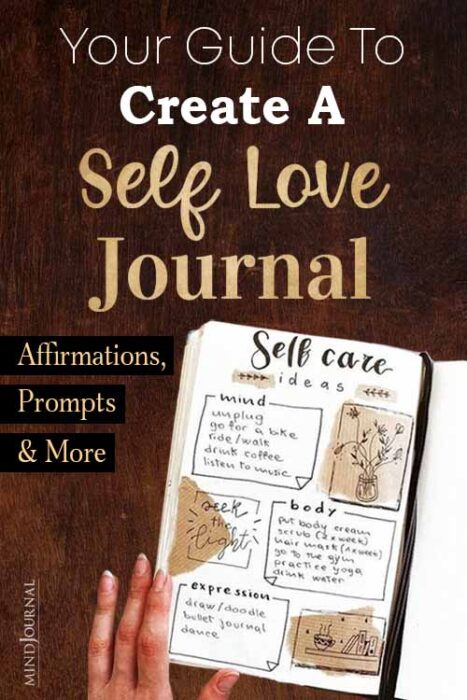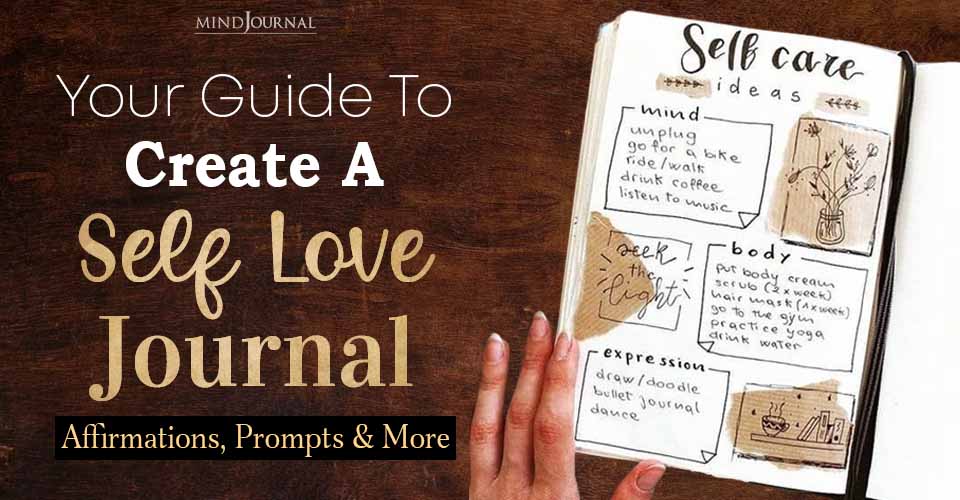Self-love is an important step in inner healing and personal growth. It’s not just about pampering yourself with a bubble bath or a new outfit (although those can be part of it!). It’s also about the deeper stuff, like understanding your emotions and accepting your flaws. And using self-love journal prompts can really make a difference on this journey.
Self-love journal prompts are powerful tools that guide you to reflect on your thoughts and feelings, helping you understand yourself better and build a healthier relationship with yourself. Today we’ll discuss how you can make your own self-love journal and some prompts to get you started!
Why you should make a self-love journal?
Self-love journaling can be a catalyst in your journey to self-discovery, personal growth, and inner healing. Here are a few reasons why you should consider creating a self-love journal:
1. Cultivates self-awareness
A self-love journal will help you become more aware of your thoughts, feelings, and behavior patterns. When you start reflecting on your day-to-day experiences, you start noticing patterns in how you react to different situations. You also become aware of your triggers and how to handle them.
This increased self-awareness in turn helps you understand yourself better and shows you your soft spots and areas that you need to work on. Not just that, self-love journaling will also help you realize what truly brings you joy and fulfillment.
2. Promotes inner healing
Writing about your experiences, especially difficult ones, in a safe and private space can be therapeutic. Moreover, expressing your thoughts on paper can help you make sense of past traumas and let go of lingering pain.

This practice of self-reflection and expression can lead to profound inner healing, helping you move forward with a lighter heart and a clearer mind.
3. Facilitates personal growth
Documenting your goals, dreams, and progress in a self-love journal can be incredibly motivating. It serves as a tangible reminder of your aspirations and the steps you’re taking to achieve them. As you look back on your entries, you’ll see how far you’ve come and recognize the personal growth you’ve experienced over time.
This reflection can inspire you to keep pushing forward, even when faced with challenges. It also helps you stay accountable for your personal development journey.
4. Increases gratitude
A gratitude section is a must-have in any self-love journal. Expressing gratitude is a powerful way to shift your mindset towards positivity. By writing down things you are grateful for each day, you train your brain to focus on the good rather than the bad.
This practice can improve your overall mood, reduce stress, and increase your sense of happiness.
Read More: How To Put Yourself First In A Relationship: 20 Tips For Prioritizing Yourself
Getting Started: Setting Up Your Self-Love Journal
Now that you are aware of the importance of self-love journaling, we will now discuss how to set up a self-love journal. Follow the steps given below to begin your self-love journaling journey:
Selecting writing tools and materials
The first step is to choose a journal that speaks to you. It can be a journal with a quote that resonates with you or could be a digital one, just make sure it’s something you enjoy looking at and writing it. Then, gather your journal, pens, and any other supplies you might need close at hand, like glitter pens or highlighters for aesthetic purposes.

Creating a welcoming and relaxing space for journaling
The environment is important while journaling. So make sure you find a quiet spot where you can focus and relax. It could be a cozy corner in your room, your favorite chair, or even a quiet spot in a park. You can also light a candle, play some calming music, or wrap yourself in a soft blanket, whatever makes it better. Also, minimize distractions. Turn your phone on to DND mode.
Prompts and Exercises for Self-Reflection and Healing
Apart from writing down how you are feeling every day, you can supercharge your healing by doing some shadow work. You can include prompts and mini-exercises to help you dig deeper into your thoughts and emotions. Plus, they make journaling a whole lot more fun!
Here are some prompts to help you get started:
Daily affirmations for self-love and acceptance
- I am worthy of love and respect.
- I have a perfect body.
- I treat myself with kindness and patience.
- I accept myself unconditionally.
- I am worthy of all the good things in life.
- I forgive myself for past mistakes.
- I release the need to seek validation and approval from others.
- I am resilient, strong, and brave.
- I radiate confidence, self-respect, and inner harmony
- I welcome positive energy and I send it out to others.
Reflective prompts for exploring self-limiting beliefs
- What beliefs do I hold about myself that might be stopping me from reaching my full potential?
- What’s a dream or goal I’ve held back on pursuing, and why?
- When faced with a challenge, what’s the first thought that comes to mind?
- When receiving compliments or recognition, do I brush them off or fully accept them? Why?
- What recurring negative thoughts do I have about myself, and where do they come from?
- What would my life look like if I fully embraced my worth and potential, without the influence of self-limiting beliefs?
- Can I identify any patterns in my behavior or decisions that stem from self-limiting beliefs?
- When do I feel most insecure or doubtful about myself? What thoughts or beliefs tend to accompany those feelings?
- How can I actively work to replace these self-limiting beliefs with empowering ones, and what steps can I take to reinforce this change?
- What evidence do I have that contradicts my self-limiting beliefs?
Gratitude exercises for cultivating appreciation and joy
1. Gratitude Jar
It means exactly what it sounds like. Find a jar, and decorate it however you like. And then fill the jar with three things you are grateful for at the end of the day. It can be anything, even simple pleasures such as a cat letting you pet them or having coffee at your favorite cafe. If you want to make things fun, you can fold the paper into little stars after writing the things you are grateful for.
2. Gratitude Diary
The good already exists within you. But sometimes we tend to ignore that. Use a gratitude diary to appreciate parts of your life, personality, or body that you might overlook otherwise. Here are a few gratitude prompts for self-appreciation:
- What do you like most about yourself?
- What is something that was hard to do but you did it anyway?
- What is your favorite part of your daily routine?
- Who are three people I am thankful to have in my life, and how have they made a positive impact on me?
- What is one thing I’m grateful for in my life right now, and why does it bring me joy?
3. Gratitude Affirmations
The more gratitude you express, the more reasons you will find to be grateful. I’m not just that for the sake of it, it is the truth. Don’t believe me? Try it for yourself. Start with these:
- I am grateful for the abundance of love and positivity that surrounds me every day.
- I appreciate the simple pleasures in life and find joy in the little things.
- I express gratitude for my body and all it allows me to do, honoring its strength and resilience.
- I am thankful for the experiences that have shaped me into the person I am today.
- I am grateful for the abundance of opportunities that come my way, and I embrace them with an open heart.
Read More: 8 Things That Can Stop You From Losing Your Identity In A Relationship
Forgiveness practices for releasing negativity and resentment
Forgiveness is powerful but it’s not always an easy thing to do. However, once you choose to forgive someone, you also choose to let go of the resentment that has been holding you back and making you bitter. Here are a few forgiveness practices for releasing negativity and resentment:
Acknowledge your feelings
First things first, it’s important to acknowledge what you’re feeling. Sometimes, we push down our emotions because we think it’s easier or we don’t want to deal with them. But trust me, facing them head-on can be incredibly freeing. Sit with your feelings for a bit. Write them down if that helps. This isn’t about wallowing; it’s about understanding where your negativity and resentment are coming from.
Meditate or pray
Meditation and prayer can be powerful tools for letting go. Sit in a quiet spot, close your eyes, and take a few deep breaths. Focus on the present moment. If you meditate, visualize the negativity and resentment leaving your body with each exhale. If you pray, ask for guidance and strength to forgive and release any negative feelings associated with the situation.
Write a Forgiveness Letter
This one might sound a bit old-school, but writing a letter can be incredibly therapeutic. Write to the person who hurt you. You don’t have to send it, you can either burn it or trash it. But remember to pour out your feelings, and all the pent-up resentment, then express your intention to forgive. You might be surprised at how much lighter you feel once you let go.

Tracking Progress and Celebrating Achievements
Tracking progress and celebrating achievements, even the little ones, is an important part of the inner healing journey. So, let’s break it down:
1. Set intentions and goals for personal growth
Before you start your healing journey, set clear intentions about what you want to achieve– whether it’s boosting your self-esteem, embracing your authentic self, or simply being kinder to yourself. This not only gives you direction but also serves as a reminder of why you started.
Consider setting small, achievable goals along the way. For instance, aim to write in your journal three times a week or practice a daily affirmation. These goals will keep you motivated and focused on your growth.
2. Reflect on milestones and accomplishments
Take time regularly to look back and reflect on the milestones you’ve hit and the accomplishments you’ve achieved. This could be anything from overcoming a negative thought pattern to successfully setting a boundary in a relationship. Write about these moments in your journal. Reflecting on your progress helps you see how far you’ve come.
3. Celebrate self-love victories and moments of resilience
Whenever you achieve a goal or navigate a challenging situation with self-compassion, take a moment to acknowledge and celebrate it. This could be as simple as treating yourself to your favorite snack, writing a positive note to yourself, or even sharing your success with a friend.
Celebrating these moments reinforces the positive behaviors and reminds you of your strength and resilience. It’s a way of saying, “I see you, and I’m proud of you,” which is incredibly powerful for your self-love journey.
Read More: How To Put Yourself First Without Feeling Awful
Integrating Self-Love Practices into Daily Life
Learning to love oneself is a process. And just like anything else, it needs time, effort, and consistency. So, it is important to integrate self-love practices into daily life. Here’s how you can do it:
1. Developing self-care rituals and routines
Incorporating self-love practices into your daily routine starts with establishing solid self-care rituals and routines. Take some time aside for yourself no matter how busy or tired you are. It can be as simple as making time for meditating or doing a skincare routine.

If you are for some reason not able to find some “me” time during the day, make it a habit to say your affirmations when you go to bed before you fall asleep. Whatever it is, consistency is key
2. Setting boundaries and prioritizing self-care
Another vital aspect of integrating self-love into your daily life is setting boundaries and making self-care a priority. This means knowing when to say no, whether it’s declining extra work hours or turning down social invitations when you need time for yourself.
It’s about recognizing your limits and honoring your needs, even if it means disappointing others occasionally. Prioritizing self-care isn’t selfish; it’s essential for maintaining your mental, emotional, and physical well-being in the long run.
3. Cultivating self-compassion in challenging moments
Instead of being your own worst critic when things go wrong, practice treating yourself with the same kindness and understanding you’d offer a friend.
Remember, setbacks are part of everyone’s journey, and like others, you’ll overcome them too. Do not beat yourself up over it. Mistakes are opportunities for growth and allow yourself the grace to learn and move forward.
As you cultivate self-compassion, you’ll find yourself developing a deeper sense of self-love along the way.
Final Thoughts
Learning to love yourself takes time and patience, but you will get there, I promise. To speed up the process and make it a little more interesting, consider making a self-love journal. Keeping an inner healing journal, self-discovery workbook, or self-care diary whatever you want to call it, will help you dig deeper into your thought patterns and help you understand your triggers and reactions to them.
Are you going to make a self-love journal? Share your favorite prompts and affirmations with us in the comments below!
Frequently Asked Questions (FAQs)
How does journaling help you heal?
Journaling provides a safe space for expressing pent-up emotions, allowing you to process the negative emotions, gain insights from them, and become more self-aware. It serves as a therapeutic outlet for working through challenges and trauma.
How do I create a self-love journal?
Choose a notebook that speaks to you and decorate it as you wish. The next step is to set aside some time and decide on a few prompts that encourage self-reflection, self-compassion, and personal growth. Once that is done, viola! you are all set.
What to include in my self-love journal?
You can include prompts for self-reflection, affirmations to boost confidence, gratitude lists, reflections on accomplishments and challenges, creative exercises for self-expression, and any thing that inspires and uplifts you in your self-love journal.










Leave a Reply